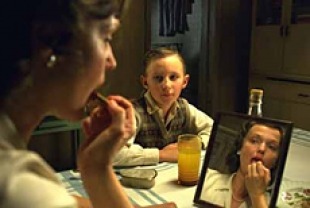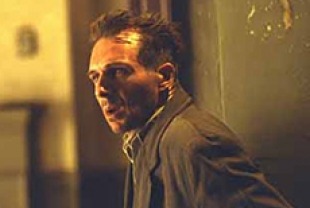Nothing is ever lost or forgotten. Everything we have seen, heard, tasted, touched, or felt is stored in our memory. We dive into that reservoir to find what has happened in our lives. Sometimes we get it right. Other times we grab hold of a story we have told ourselves about what really happened. In this case, we could more accurately speak of the theatre of memory. There are many characters, some real, some made-up. We can watch the entire play or just a scene or two. Sometimes we become obsessed with just one moment and replay it over and over in our minds.
Canadian film director David Cronenberg (Crash, eXistenZ) stated in an an interview that he is a card-carrying existentialist; making a movie for him is a philosophical exploration. That is certainly evident in Spider. Only the most adventuresome filmgoer will be able to savor this dank, dark, and meticulously detailed portrait of a troubled man who plunges into his past. All of us have seen deranged men and women on the streets lost in their own very vivid diatribes and ravings. This intense and claustrophobic drama is written by Patrick McGrath based on his 1990 novel. Pretend that he has given us the back story of one mentally ill man wandering down a London street.
Spider (Ralph Fiennes) has been released from a mental institution and sent to live in a halfway house run by Mrs. Wilkinson (Lynn Redgrave). He is a disheveled man with nicotine stains on his fingers from a lifetime addiction to cigarettes. He seems oblivious to the world around him, lost in his many mumblings and obsessively scribbling letters in a little notebook. Terrence (John Neville) describes their home as an island apart from the loud world. He calls Mrs. Wilkinson a tyrant. Spider doesn't seem to care about anything exccept his memory theatre and the strange gasworks buildings across the street from his new residence.
When he was a boy (Bradley Hall), his mother (Miranda Richardson) told him a story about spiders and the webs they weave. He loved this tale so much that she started to call him "Spider." There was tension in their home due to his father's (Gabriel Byrne) regular excursions to a pub. A turning point in Spider's life comes when he sees his usually prim and proper mother in a sexy new slip she has purchased to please her husband. Another is a trip to the pub to retrieve his father for dinner and being shamed by Yvonne (Alison Egan), a slutty woman. In his mind, his mother is transformed into this aggressive and bawdy woman. The story Spider tells himself becomes more inventive and leads to a brutal murder.
It is terrible to live a fear-based life based on conspiracies and paranoia. Spider creates a memory theatre that deranges his life and compels him to obsessively replay certain key scenes. Eventually we learn the shocking results of his storytelling. His penchant for seeing his mother in others even reaches into the present moment.
Ralph Fiennes makes the most of Spiders quirks, loneliness, and delusions in a rigorous performance that is very theatrical in its intensity. Director Cronenberg challenges us to consider the layers of meaning in our memories and the dangerous disconnections with reality that can grow out of the stories we tell ourselves.
The DVD includes an interesting audio commentary with director David Cronenberg in which he talks about what fascinated him about this character. Featurettes include background on how the film came to be made and interviews with the principal cast.

